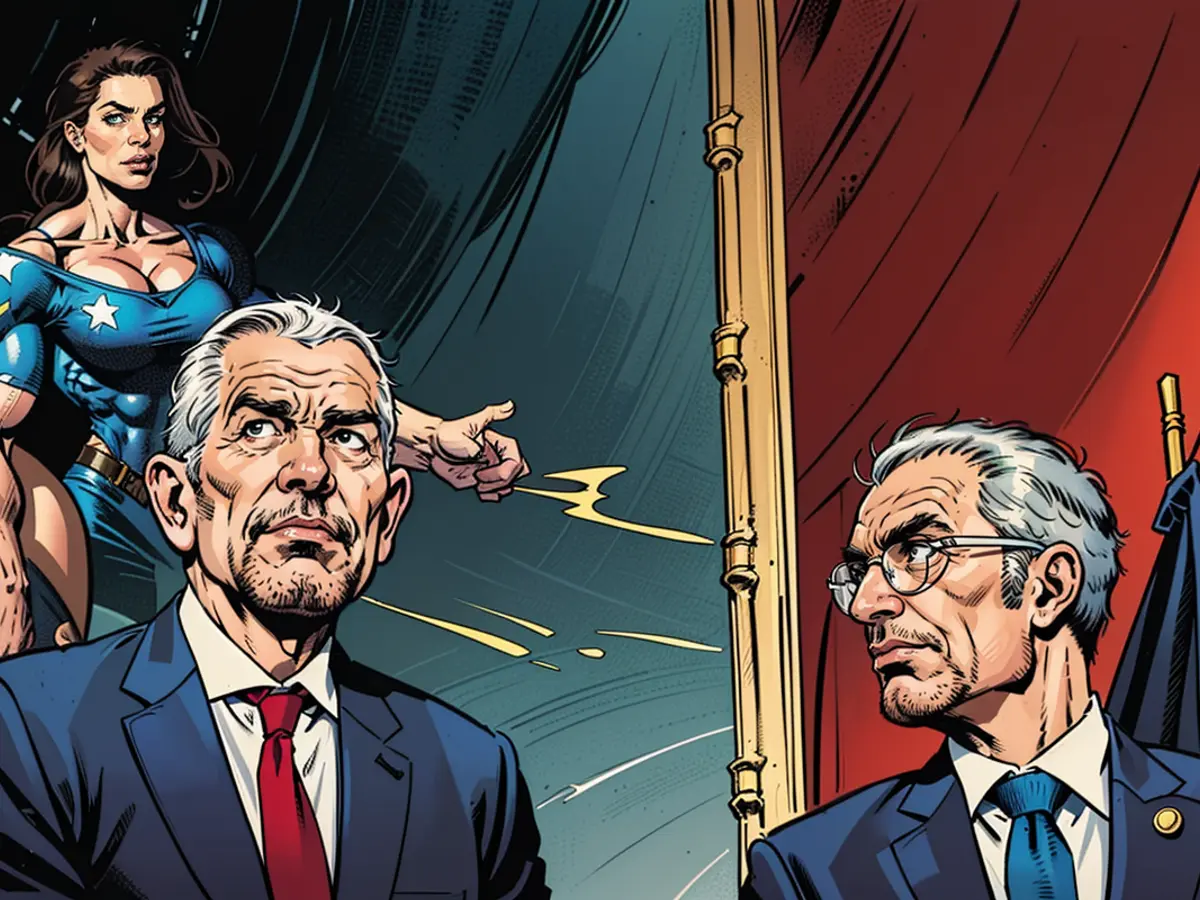Potentially, the FPÖ might share power in Austria's government.
Following the Austrian elections two weeks ago, no new government has surfaced yet. The possibility of a power-sharing role for the election victor, FPO, isn't out of the question. Internal strife within the Social Democrats (SPO) is fostering scenarios where "People's Chancellor" Kickl might emerge victorious.
This circumstance can't come at a more inconvenient time, according to a political analyst based in Vienna. She likens the instability within the Austrian SPO to an unwanted growth on the throat, making the ongoing government formation process even more challenging in Austria. After the National Council elections, there's no clear indication of the potential future rulers of the country. Instead, the situation is filled with speculation.
This SPO instability was sparked by Rudi Fußi, an advertising consultant with a colorful political past. He was known for sympathizing with the ÖVP's youth wing earlier and later shifting allegiances to the SPO. He's enjoyed supporting both left-wing and right-wing SPO candidates in turns. At a recent press conference, Fußi spoke at length, praising his SPO colleagues while also criticizing their left-wing campaign and indecisiveness on immigration and economic policies. He publicly announced his ambition to become SPO chairman, despite acknowledging the difficulties involved.
Arguments against a grand coalition
Fußi's candidacy could spell trouble for the SPO. He needs many party signatures for his bid, but that's not the main point. The real concern is adding another opponent for SPO leader Babler, making the party's future direction even more uncertain and possibly complicating coalition negotiations with ÖVP. While a grand coalition is widely considered the most likely outcome, it isn't the most probable.
Van der Bellen, the Austrian Federal President, isn't bound by any legal requirements to hand over power to the election winner. He announced last week that he would give the top candidates of the three major parties – FPO, ÖVP, and SPO – a week to reevaluate their positions before beginning negotiations.
The Austrian myth used to go that, if all else fails, a grand coalition between the SD and ÖVP would always work. However, the political landscape has changed since then, with five parties now represented in the National Council – the election winner FPO, economic liberal NEOs, and the Greens. The Greens may not play a significant role in government formation, as negotiations with them are seen as complex. Reaching an agreement with the other parties could be more advantageous.
The challenge of forming a grand coalition
A grand coalition would have its own challenges. The two parties barely manage to scrape together a majority. Beyond their common democratic self-perception, they have little in common. The SD wants to impose taxes on the wealthy, while the ÖVP opposes tax increases and instead supports lowering corporate taxes – an idea the SD is not fond of. The ÖVP advocates for faster asylum procedures and swifter removal of criminal migrants. The SD rejects excessive measures. The ÖVP's public broadcaster ORF is a matter of contention, as reducing its size is unacceptable to the SD. Finally, Babler is a divisive figure within the ÖVP, which could lead to dissenters emerging. However, the narrow parliamentary majority leaves no room for compromise.
Bringing in a third party could solve these issues. The NEOs suggest a "rainbow coalition" involving the ÖVP, the SD, and the Greens – a term inspired by the coalition partners' party colors: turquoise, red, and pink. While some Austrians might support this idea, it's not widely popular, with the German traffic light coalition serving as a deterrent. Austria has only had a three-party coalition post-WWII for less than nine months and under Allied supervision.
Would the FPO support Nehammer as the leader of a coalition?
Given the complex nature of the current situation, rumors around another coalition option are circulating in Vienna's political circles: The FPO and ÖVP's views overlap in many areas, and Nehammer, the ÖVP leader, has dismissed the idea of forming a coalition with Kickl's FPO over concerns about Kickl's association with right-wing extremists, fraternities, identitarians, and Russian President Putin.
But what if Kickl played no significant role in leading such a coalition? The thought: In the first half of the five-year legislative period, FPO and ÖVP would form a joint coalition, with Nehammer as the federal chancellor, even though FPO is the largest party in parliament. Only time will tell.
Moving forward, what could theoretically transpire? Present Federal President Van der Bellen doesn't favor designating a Federal Chancellor from the FPO. He has the option to refuse. His tenure concludes in 2027. Unlike in Germany, Austria's Federal President is chosen by the citizens. It's plausible that Van der Bellen's successor hails from the FPO ranks. This new leader could then choose a fitting replacement for Nehammer as Federal Chancellor. Granted, this would be a significant gamble for the FPO and OVP, albeit with minimal risk.
An unspoken possibility that hasn't been voice-boxed yet, at least not openly: Could "People's Chancellor" Kickl swap positions with "People's President"? What's his strategy, this Kickl fellow who openly declared last week that he solely seeks to lead as Chancellor? Would he ditch the Nehammer-led blue-turquoise coalition and instead crusade for the Hofburg throne? A seasoned Austrian political spectator chuckles at the prospect of such a chain of events. Then, his chuckles get caught in his windpipe.
The Commission, referring to the Austrian government formation commission headed by President Van der Bellen, is currently giving the top candidates of the three major parties a week to reevaluate their positions before negotiations commence. Despite the Commission's efforts, the instability within The Commission, specifically the Social Democrats (SPO), is making the government formation process even more challenging in Austria.








